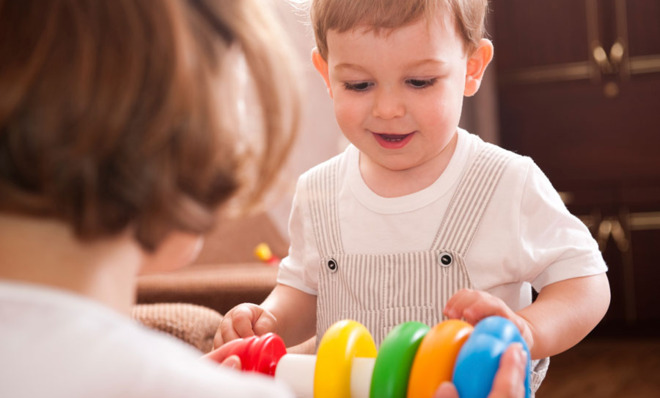How moms change brains
A team of scientists scanned children's brains with an fMRI machine. Here's what they found.

A free daily email with the biggest news stories of the day – and the best features from TheWeek.com
You are now subscribed
Your newsletter sign-up was successful

For little kids, seeing mom or dad nearby is a calming influence, maybe the difference between between perfect calm and a full-bore freakout. It's as if having a trusted caregiver nearby transforms children from scared toddlers into confident adolescents. And in a way, a new report suggests, that's what having mom around does to a kid's brain.
When they're first born and for years after, infants and young children can't do a whole lot by themselves. They can't eat on their own, they aren't very good at managing their emotions, and it takes a while for them to learn how to dress themselves. Most children figure it out eventually, but in the meantime they need their parents to do a lot of that stuff for them. All the while, their brains are changing, too. Well into adolescence, kids' brains undergo anatomical and physiological changes that affect the way we think and act.
That observation led Nim Tottenham and her lab at the University of California-Los Angeles to wonder whether a child's brain might function differently depending on whether she or he can see her mother. In particular, Tottenham wanted to know whether being able to see mom would change connections between the amygdala — an area of the brain that's been linked to emotional responses, among other things — and the prefrontal cortex, the part of the brain thought to be responsible for integrating and processing information before turning it into action.
The Week
Escape your echo chamber. Get the facts behind the news, plus analysis from multiple perspectives.

Sign up for The Week's Free Newsletters
From our morning news briefing to a weekly Good News Newsletter, get the best of The Week delivered directly to your inbox.
From our morning news briefing to a weekly Good News Newsletter, get the best of The Week delivered directly to your inbox.
To find out, the team used functional magnetic resonance imaging, or fMRI, to scan the brains of 23 children between the ages of four and 10 and another 30 kids aged 11 to 17 while they viewed a series of photographs. For 28 seconds at a time, each child viewed a picture of his or her mother or a stranger, both of whom might be smiling or wearing a neutral expression. In a companion experiment outside the scanner, children viewed a series of pictures of faces and were told to press a button when they saw a particular expression, such as a happy face.
Young children's brains responded differently based on whether they were looking at their mothers or strangers. In particular, their brains showed signs of positive amygdala-PFC connections when viewing pictures of strangers, but negative connections when viewing pictures of their mothers, suggesting more mature and stable brain function — and likely more mature and stable behavior, at least when moms were around. In contrast, tweens and teens had negative connections whether they were looking at their mothers or strangers. In other words, looking at pictures of their mothers made young children's brains look a little more like those of adolescents.
The companion behavioral experiment backed up that thinking — young children made around 20 percent fewer errors when their mothers were present than when they weren't, while there was no difference for adolescents. That combined with the fMRI results to suggest that mothers — and likely other caregivers — can provide an external source of mental regulation that young children won't develop until later in life, the authors write in Psychological Science.
Pacific Standard grapples with the nation's biggest issues by illuminating why we do what we do. For more on the science of society, sign up for its weekly email update or subscribe to its bimonthly print magazine.
A free daily email with the biggest news stories of the day – and the best features from TheWeek.com
More from Pacific Standard...